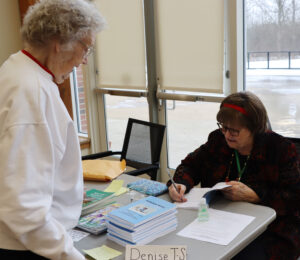Resident Reflections: Hive Mind and the Introvert by Denise Thompson-Slaughter
One of the many things I like about living at Brickstone by St. John’s is the collaborative “hive mind” that can develop in conversations among those who are beginning to have anomia—the mildest form of aphasia. It involves difficulty remembering the exact word we want when speaking. It can be triggered by the gradual slowdown in memory retrieval and processing speed of aging—but also by certain medications, stress, fatigue, emotional states, or neurological conditions, so it can really begin at any age.

Being a bit of an introvert, it is a condition I have struggled with for much of my life. Ironically, it only affects me when speaking, not when writing.
According to writer and introvert Jenn Granneman and a recent Harvard study, introverts have a particularly difficult time converting their visual images to verbal ones when they are speaking, as opposed to when they are writing. This often makes them self-conscious, which is enough to cause them to feel stress or social anxiety that in turn prompts their brains to release cortisol—interfering further with memory and concentration!
Brain imaging shows that introverts, unlike most people, are also better with long-term memory than short-term memory, but it requires a bit more time to retrieve the long-term memory. I have often had the experience of listening to a conversation go around and around past me, like a carousel, while I look for a place to jump in.
With a very talkative group, however, by the time they slow down enough for me to insert what I want to say, they have moved two topics further down the road and my comment is no longer relevant.
Writing, on the other hand, uses different brain pathways that, for introverts, flow more fluently. Not surprisingly, many writers are introverts.
When I’m in a conversation with others who are of an age where they occasionally blank out on the word they’re looking for, I can almost always fill in the blank for them, even though I probably wouldn’t have been able to come up with the not-everyday word if I were the one speaking—and they can do the same for me.
So, a hive-mind conversation among a group of the many well-educated women in our community may go like this:
Angela: “How was the RPO concert last night?”
Berni: “Oh, it was wonderful! They played a lot of music by—oh, who’s that guy who wrote the lullaby?”
Claire: “Brahams?”
Berni: “Yes.”
Deirdre: “Who drove the bus to the theatre? I noticed you all didn’t get home until 11. I was just getting ready for bed when I heard the bus pull up.”
Berni: “It was Arthur. He’s so funny!”
Deirdre: “Is Arthur the one with the little…” [gesturing to the lower part of her face]
Angela: “Beard?”
Berni: “No, not ‘mustache’ either”
Ernestine: “Soul patch?”
Berni: “Yes!”
Felicia: “Oh, he’s sweet.”
Gemma: “I notice they’re re-releasing the film about Mozart and … what was his name?”
Claire: “Salieri?”
Gemma: This is totally off topic, but I heard that Mary—I know, there are a million Marys here, and I can’t remember her last name, but she’s in one of the bungalows by the pond—her husband’s nickname is Buck. Anyway, I heard Mary fell and broke her ankle on Tuesday.”
Angela: “Oh, no! That’s awful!”
Berni: “Poor Mary! She and Buck seem so nice!”
Claire: “Ladies, I think we have to clear out of the room now. They’re starting to set up for the drumming class in here.”
Ernestine: “That looks like fun. I might try it some time.”
Claire: “It’s not for me. As far as I’m concerned, the only thing worse than drums is bagpipes. I hope nobody starts a bagpipe group next!”
[All laugh.]
The next day, Mary and Buck by the pond will be deluged with soups, salads, desserts, and get-well cards, of course. What wonderful people we have here! Even some of the visiting physical therapists and other rotating professionals say so.
“We love it here,” they say. “The people here are so friendly and happy. That’s not the case at all the retirement communities.”
As for the hive mind, it works out especially well during the monthly Jeopardy contests. The questions are not always easy—they’re taken from past episodes of the real “Jeopardy” TV show. But because we play on teams, rather than as competing individuals, there’s likely to be someone on your team with the arcane knowledge or experience who can come up with the answer. . . even though it may take a little hive-mind questioning or prompting! Fortunately, we’re allowed a full minute for brainstorming rather than the mere twenty seconds TV players are afforded.
This is an excerpt from “Brickstone Writes: From the Serious to the Hilarious,” edited by Denise Thompson-Slaughter and Berdjouhi Esmerian, and features the work by other Brickstone by St. John’s writers. The book can be purchased here.
